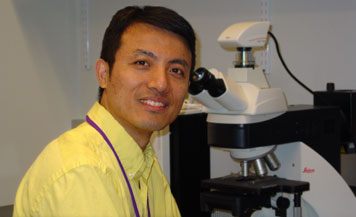Meet our Researchers
Eugene Xu, PhD – Assistant Professor Obstetrics and Gynecology
What are your research interests and current projects?
 I am interested in genetics, generally. Specifically, I would say that the overall goal of my research efforts is to understand the genetic and developmental mechanisms of reproduction, in particular, germline development in mammals. In my major research study, we are looking at how key events, such as the differentiation of stem cells, is regulated. We use both mouse and the fruit fly (Drosophila) models to study highly conserved reproductive regulators since the fundamental process of germ cell development is similar to humans.
I am interested in genetics, generally. Specifically, I would say that the overall goal of my research efforts is to understand the genetic and developmental mechanisms of reproduction, in particular, germline development in mammals. In my major research study, we are looking at how key events, such as the differentiation of stem cells, is regulated. We use both mouse and the fruit fly (Drosophila) models to study highly conserved reproductive regulators since the fundamental process of germ cell development is similar to humans.
The pathways that develop the germ cell appear to be conserved broadly in organisms as diverse as invertebrates and mammals. We believe that there exists conserved core machinery that regulates the germ cell development and we seek to define the components of this process through an evolutionary, genomic and genetic approach. This way, we hope to unveil the underlying molecular process of germ cell development, which will further our understanding of stem cell and reproductive biology.
Another of my research projects involves study of the role of human fertility family-DAZ family, deletions of which is one of the most common molecular lesions of human infertility . We are particularly interested in the founding member of this family—BOULE and its function in sperm production as well as the evolutionary history of this important human reproductive gene family.
What is the ultimate goal of your research?
My germ cell studies are aimed at helping us understand and identify the genetic causes of infertility. One potential future application of our work is to further understand and then address the molecular causes of the 10 to 15 percent of infertile couples for whom there is seemingly no explanation. We believe some of this “idiopathic” infertility may involve disruption of sperm development attributable to germ cell regulators. Our work could then have usefulness in improving diagnosis and the treatment of infertility, .and also in developing new options in male contraception. In addition, this research enhances our knowledge about stem cells, which offers great potential benefit to our understanding and treatment of diseases such as cancer.
Another goal of mine is less health-related but could have implications for medicine. It is to understand the evolutionary history of human reproductive regulatory machinery. Sexual reproduction is such an ancient process widespread in the nature and yet reproductive process is known to rapidly change. Hence, it is particularly interesting to understand how a core machinery in reproduction could be maintained from flies to humans and how we human have gained complexity of regulation by evolving new components to the core machinery. Such understanding might provide complementing perspective on how we look at the common reproductive diseases such as infertility and gynecological diseases.
What brought you to the Feinberg School of Medicine?
I came to the Feinberg School of Medicine in 2005 from the University of California. But I had lived in Chicago previously, when I was getting my doctorate at the University of Chicago. I met my wife here, and we were both very interested in returning to the city. Moreover, Northwestern offers great advantages to scientists. In particular, there is a strong commitment to translational research and research in the area of reproductive medicine, which is my interest, and the Feinberg School provides a very stimulating and forward-looking environment. I am happy to be here.
What are some of the challenges you face?
Funding is always an issue. My major research is funded by NIH, and we are lucky to be supported by Northwestern on the stem cell study. In addition, I would say that one of the greatest challenges is to maintain focus on the work at hand. In this exciting environment, with access to so much technology, genomics data and support, it can be tempting to continually divert beyond the current study.






